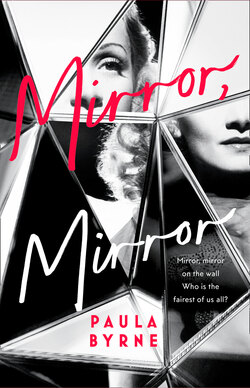Читать книгу Mirror, Mirror - Paula Byrne - Страница 11
I Like America
ОглавлениеNight falls quickly in Hollywood. The Child removes her mother’s shoes and leaves them to cool. Later, they will be stuffed with tissue and stored away in their chamois bags. Slippers are placed on Madou’s feet; she is wearing natty cream silk lounging pajamas, with a black velvet trim.
She looks at me, her reflection in threes. The Holy Trinity. A nimbus of light frames her face. She rubs on cold cream, flannels it off, stares again with deep concentration. Her fair hair is damp and swept back from her face. Her skin is pale, slightly pink, translucent like the finest porcelain. She resembles a beautiful boy. Beautiful boy triplets. How divine. I hum softly:
Mad about the boy
I know it’s stupid to be mad about the boy
On the silver screen
He melts my foolish heart in every single scene …
Madou picks up the telephone. As usual, she’s booked a call to the husband she never sees, back in Europe: ‘Papi, sweetheart, Chevalier told me Lombard smells of cheap talcum powder, so I said, “What place did you smell it?” So, of course he was stuck and couldn’t answer. Can you imagine his face? Mo was magnificent today. Do you know what he said to me? “No one lights you like I do, because no one loves you like I do.” He knows now that he should never have abandoned me. That last picture was an abortion. We belong together. With this picture, we will make history. She has never looked more beautiful, but it’s all down to Mo.’
The Child pours a glass of champagne from the ice bucket, and places it on the poudreuse. She is reading something; fairy tales by the Brothers Grimm, no doubt she’ll skip over Schneewittchen. She’s munching on potato chips, stuffing them into her cakehole, in greedy, fat handfuls.
Madou squints at her reflection, and then relaxes into a state of dreamy contemplation as she continues her telephone conversation: ‘Peter has as much sex appeal as a dish of leftover potato salad. Of course, that pleases Mo. He’s so jealous, unlike you, Papi, who have every right to be jealous, but is never. I have to go now. Kisses to you.’
Tonight, Madou is gay and jocular, but I, for one, have not forgotten her agony when her director ran away. Memory is viciously insistent on such occasions. Again and again, late at night, tired and alone, she’s gazed into me, eyes half-closed in recollection, and told me, told herself, the story. How Mo had discovered her in the filthy backstreets of Berlin, brought her to Hollywood, made her a star, and then left her to the mercy of this nest of vipers.
She was just nineteen and the mother of a baby girl when she boarded the boat train at the Lehrter Bahnhof for New York followed by the long train ride to Pasadena. The little man was dismayed when he first saw her in her grey two-piece suit, looking like a lesbian; he instructed her to lose weight, and to buy better clothes.
Just like that – ‘lose the weight’ and, good soldier that she is, she did. She stopped eating. She took up smoking, sipped beef tea and hot water with Epsom Salts and drank endless cups of coffee. She loathed American coffee, but she drank the ‘gnat’s piss’ all the same.
She adores Mo, refusing to believe the stories that he began his working life as an errand boy in a lace-making warehouse in New York. In her eyes, he was a genius of aristocratic Prussian stock. Her saviour.
In Hollywood, he set about the business of lighting. He despised most actors. ‘Directing actors is practising puppetry,’ he told her. ‘It’s about light and shadow.’
That first day on the hot set, she complained about her Slavic nose. He smiled, took out a phial and painted a silver line on the centre of the nose – then climbed onto the set to adjust a tiny spot to shine directly on the line from above her head, reducing the nose by a third.
Madou was a quick learner. From that moment on, she would sit before me or some other mirror, and draw a line of white paint down the centre of her nose (in a shade lighter than her base), lining the inside of her lower eyelid with white greasepaint – using the rounded edge of a thin hairpin.
Then she held a saucer over a candle, where a black carbon smudge would form on the underside, and mixed in a few drops of lanolin. Warmed and mixed with the soot, it created a perfect kohl for the eyelids, which she applied with a hairgrip – heavy at the base line, then fading up towards the eyebrow.
Together, they created the famous look, the mysterious face with the sculpted cheeks. The play of light and shadow created with diffused light. Nobody lights you like I do, because nobody loves you like I do. He is a painter of chiaroscuro who sees everything in terms of light and shadow. He places his light, and only then builds a scene around it.
Who else would think of using veils and nets to create shadows? To the amazement of the crew, he removes his cigarette, and burns holes in the net to make the individual spots shine through. Then, when he is satisfied, he sets her in the light he has created for her. He is a magician, a sculptor. She is Galatea, with skin as white as milk. He is Pygmalion. Herr Direktor, her master, Lord of Light. She is his willing slave.
Together they create magic. It is a perfect partnership. He is in love with the image on the silver screen, and so is Madou. But there is a third person in this relationship. Moi. I am the mirror, that never lies.
